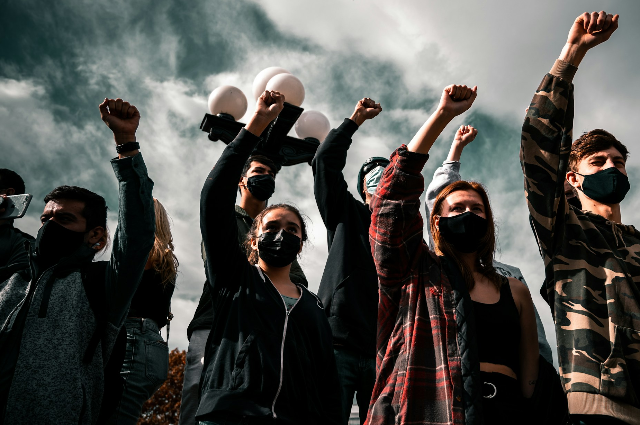
On Sunday, the family of Anis Baloch who was a victim of enforced disappearance, organized a protest on the Karachi-Quetta highway. Their main demand was the safe return of the kidnapped student. The protest was prominently supported by Baloch activist Mahrang Baloch.
Accusations of State Involvement
Mahrang Baloch highlighted the gravity of forced disappearances by labelling them as a "serious crime." She accused the Pakistani government of being responsible for the enforced disappearances of thousands of Baloch individuals. According to her, this disturbing trend is escalating with each passing day.
Appeal for Public Support
In a social media post on X, Mahrang Baloch detailed the protest at a public place on the Karachi-Quetta highway in Khuzdar. She emphasized that the families of those who have disappeared, such as Anis Baloch, are only seeking the return of their loved ones. She described forced disappearances as a severe international crime and reiterated her accusations against the Pakistani state.
Call to Action
Mahrang Baloch urged the residents of Khuzdar to join the protest in large numbers. She appealed to them to stand in solidarity with Anis Baloch's family by emphasizing the importance of public support to pressure for his safe recovery. Her message was clear that the plight of the Baloch people and their demand for justice should not be ignored and collective action is essential in addressing these human rights violations.
Alarming Increase in Forced Disappearances in Balochistan
- Case of Hanif Baloch and Saeed Baloch: In a recent post on the social media platform X, activist Mahrang Baloch highlighted a distressing situation involving two Baloch students. Hanif Baloch, a gold medalist from Bhawalpur University has been forcibly disappeared from Barkhan. His brother, Saeed Baloch, who is a student at Punjab University has also gone missing. Saeed was reportedly summoned to Lahore where he was detained illegally, further worsening the family's suffering.
- Mahrang Baloch's Outcry: Taking to X, Mahrang Baloch expressed deep concern over the escalating incidents of forced disappearances targeting Baloch students. She stated, "Forced disappearances of Baloch students have intensified. Gold medalist Hanif Baloch from Bhawalpur University has forcibly disappeared from his native Barkhan while his brother Saeed Baloch, a student of Punjab University, has gone missing after being summoned from Lahore and illegally detained."
Impact on Baloch Society
Mahrang Baloch went on to describe the severe impact of these enforced disappearances on the Baloch community. She compared the phenomenon to a cancer that is consuming the entire society, leaving no person, home, or area untouched. Mahrang emphasized that this is a dangerous form of genocide against the Baloch people. She urged the community not to remain silent by stating, "Staying silent at home against Baloch genocide is not an option. We can stop it only through public resistance and struggle."
Clashes in Chaman
Amidst these troubling reports, Balochistan witnessed further unrest. According to The Balochistan Post, at least 20 people were injured in clashes between protesters and Pakistani security forces. These confrontations continued for a third consecutive day in Chaman, highlighting the volatile situation in the region.
The forced disappearances of Baloch students like Hanif and Saeed Baloch are part of a broader pattern of domination in Balochistan. The community's call for public resistance emphasises on the urgent need for action against these human rights abuses. As tensions in the region escalate, the plight of the Baloch people continues to draw attention by demanding a response from both national and international bodies.
Violence Erupts During Protest Outside Deputy Commissioner’s Office
- Clashes Between Security Forces and Protesters: Violence broke out as security forces attempted to separate a group of protesters gathered outside the Deputy Commissioner’s office. The protesters accused the forces, police, and Frontier Corps of using excessive force, including tear gas against them.
- Authorities' Response and Arrests: According to The Balochistan Post, authorities reported that 45 individuals have been arrested. These detainees are accused of damaging both public and private property and targeting security personnel during the protests.
Impact on Local Life
The unrest has significantly impacted daily life in the area. Business centers and government offices have been shut down and the Quetta-Chaman highway has been closed. Additionally, banks have not operated for several days due to the ongoing violence.
Protesters' Demands and Frustrations
Protesters are particularly frustrated by the continued detention of their leaders. They claim that more than 48 hours have passed since the arrests, and the detained leaders from the protest in Chaman have yet to be presented in court.
Absence of District Officials Sparks Outrage
Protesters voiced their frustration over the Deputy Commissioner and other district officers being absent from their offices for three consecutive days. This absence has fuelled their discontent with both provincial and central governments, criticizing them for failing to engage in dialogue or negotiations.
Protests to Continue Until Demands Are Met
Protest leaders have vowed to persist with their demonstrations until their demands are fulfilled. They emphasized their determination to continue the movement until the previous border-crossing regulations are restored and all detained leaders and individuals are released, as reported by The Balochistan Post.
Origins of the Protests
The protests initially erupted in response to the government's introduction of strict passport and visa requirements at the border. Historically, citizens of Pakistan and Afghanistan could cross the border using only their identity cards. The new regulations were intended to combat illegal activities that have resulted in widespread unemployment in Chaman, affecting thousands of people.
Impact on Border Communities
The protesters are demanding the reinstatement of the previous border-crossing standards. They stress the significant impact these new regulations have had on families and tribes who live on both sides of the border and rely on frequent crossings for their livelihoods. These stringent measures have disrupted the daily lives of these communities, exacerbating their struggles.
. . .
References:
